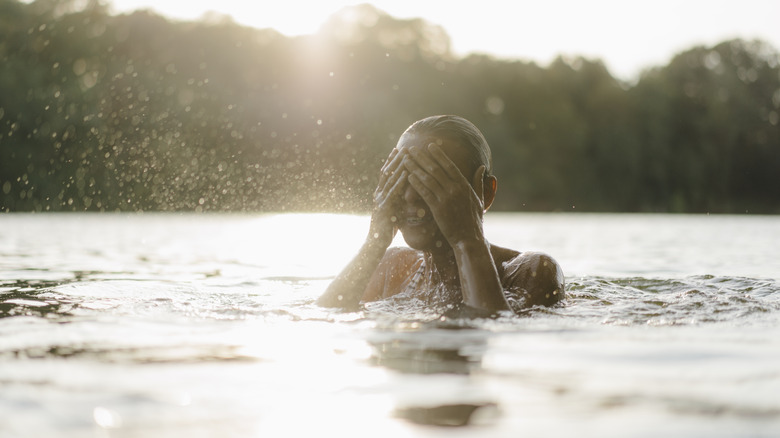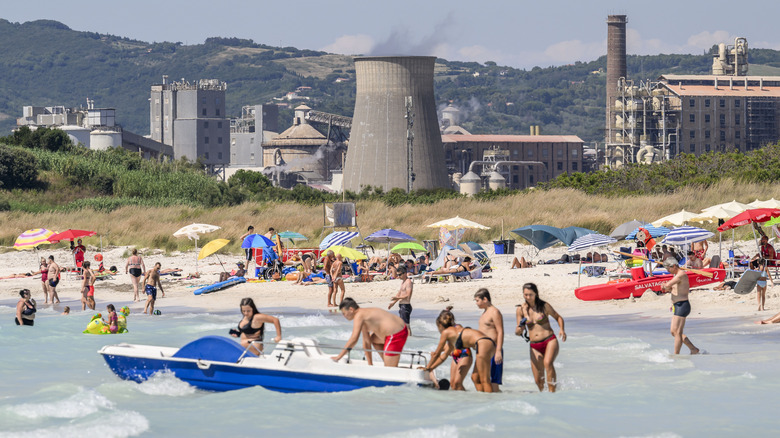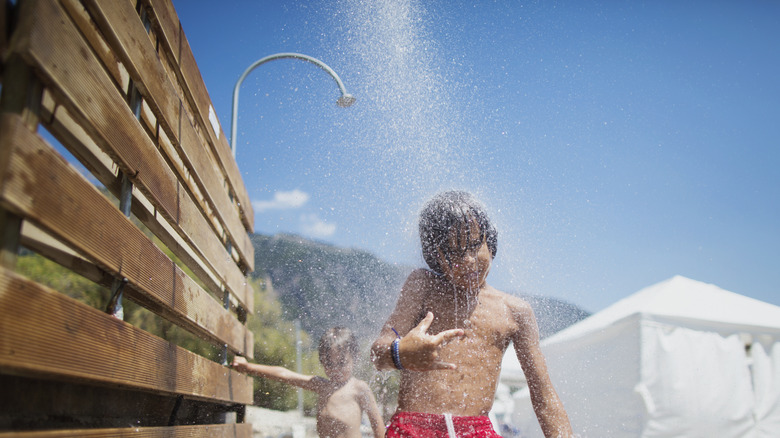Here's What Can Happen When You Swim In Dirty Water
When summer temperatures soar, the temptation to cool off with a swim in the nearest body of water grows as well. However, not every dip in the water is as refreshing as it may be imagined. In fact, depending on the quality of the water, even a quick swim may saddle you with one of a myriad of draining maladies. The potential danger of swimming in dirty water was brought to the forefront of public consciousness when triathletes at the summer Olympics in Paris allegedly became ill after practice swims in the Seine River. As reported by USA Today, the source of the illness was an elevated level of E. Coli bacteria in the river. For those unaware, this means the water is contaminated with high levels of human or animal waste, which certainly tempers the temptation to take a plunge.
While many people were baffled by how this could happen in one of the most famous rivers in the world (which is also the second largest river in France), water quality issues are far more common than most of the public realizes. In fact, according to Environment America, just in the United States, it is estimated over 50 million people become sick each year to varying degrees after swimming in rivers, lakes, ponds, bays, and oceans with dirty water. So, before you decide to dive in, you need to know what can happen when you swim in dirty water and how you can protect yourself.
What causes contaminated water?
There is a wide variety of factors and conditions that can lead to water being dangerously contaminated. Because contaminants can't always be spotted with a naked eye, dirty water is usually an unexpected danger for swimmers at the beach or on rivers and lakes. However, according to Environment America over half the beaches in the United States are deemed unsafe for swimming due to high levels of E. Coli bacteria, which can wash into rivers, lakes, and oceans from leaky sewers or high waters after heavy rain and storms. That is just one potential pollutant.
When most people hear the term polluted water, they inevitably think of industrial waste and manmade chemicals spilling through waterways. This certainly is the case in many areas, where fertilizer and other chemicals are washed into the waterways from farmlands. Improperly disposed industrial waste and oil spills are other major water quality concerns that are a result of our modern society.
However, both manmade and natural elements can make water unsafe for swimming. Toxic blue-green algae is present throughout summer on many bodies of freshwater throughout the U.S. and presents a serious threat to swimmers. Red tide and other algae blooms often occur along saltwater beaches. Warm coastal waters also often host vibrio, commonly known as flesh-eating bacteria, which can cause a dangerous, even deadly, infection.
How to stay safe when swimming
Although many swimmers are preoccupied with deadly ocean creatures or dangerous fish in freshwater rivers and lakes, the biggest threats are often much smaller. It is important swimmers put as much care into staying safe from bacteria and contaminants as they do from sharks and gators. According to the Center for Disease Control, there are a few times when you should avoid swimming altogether in order to ensure safety. If signs are posted warning of contaminants or stating a swim area is closed, stay out of the water. Additionally, it is best to avoid swimming after a heavy rain event which can wash a variety of contaminants into the waterways. You should also stay out of the water if you have an open cut or wound, the water is cloudy or smells bad, or if you see any pipes draining into the area.
Even if the water appears safe for swimming, there are a few precautions to take so as not to get sick. For one, try not to swallow any water. Take frequent bathroom breaks to avoid going in the water. If you do get in the water with a cut or wound, be sure to cover it while swimming and clean it thoroughly when you get out of the water. Once out of the water, shower or rinse off and thoroughly wash hands before eating. Finally, dry off and change into fresh clothes as soon as it's practical.


